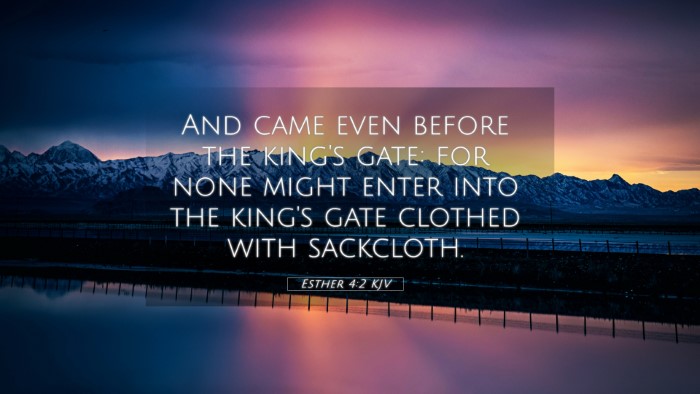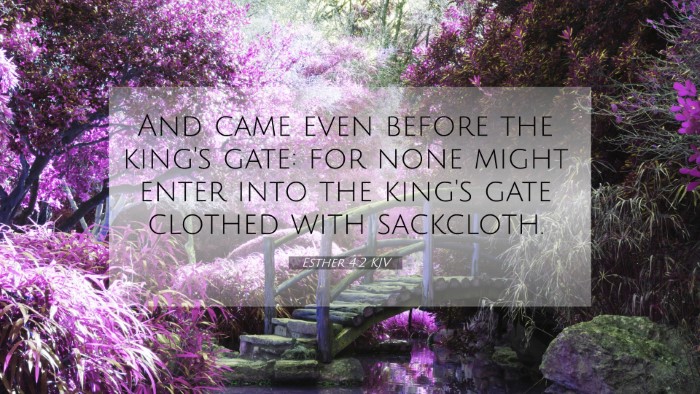Old Testament
Genesis Exodus Leviticus Numbers Deuteronomy Joshua Judges Ruth 1 Samuel 2 Samuel 1 Kings 2 Kings 1 Chronicles 2 Chronicles Ezra Nehemiah Esther Job Psalms Proverbs Ecclesiastes Song of Solomon Isaiah Jeremiah Lamentations Ezekiel Daniel Hosea Joel Amos Obadiah Jonah Micah Nahum Habakkuk Zephaniah Haggai Zechariah MalachiEsther 4:2 Similar Verses
Esther 4:2 Cross References
And came even before the king's gate: for none might enter into the king's gate clothed with sackcloth.
Uncover the Rich Themes and Topics of This Bible Verse
Listed below are the Bible themes associated with Esther 4:2. We invite you to explore each theme to gain deeper insights into the Scriptures.
Esther 4:2 Cross Reference Verses
No cross reference images were found in our system for this Bible passage.
Esther 4:2 Verse Analysis and Similar Verses
Understanding Esther 4:2
Esther 4:2 reveals a moment of great emotional and spiritual weight, where Mordecai expresses deep sorrow and distress over the impending doom facing the Jewish people. The verse reads:
"And came even before the king's gate; for none might enter into the king's gate clothed with sackcloth."
This verse is pivotal in the narrative of Esther, showcasing the themes of grief, courage, and the urgency of intervention in times of crisis.
Verse Meaning and Commentary Insights
The verse serves as a gateway to understanding the broader implications of Esther's story. Here are key insights from public domain commentaries:
-
Matthew Henry's Commentary:
Henry highlights Mordecai's public display of mourning as a reaction to the decree against the Jews. His choice to wear sackcloth and ashes signifies not just personal grief, but a communal lament that calls for attention. This act reflects Mordecai's faith in God’s ability to deliver, even while he acknowledges the dire situation of his people.
-
Albert Barnes' Notes:
Barnes notes the significance of Mordecai standing at the king's gate. He underscores that the king's gate symbolizes both a physical barrier and a spiritual one. To enter the king's presence in sackcloth was an act filled with risk, suggesting Mordecai's desperation and his commitment to the Jewish cause. The contrast between the king's palace and the misery outside illustrates the stark reality of the situation.
-
Adam Clarke's Commentary:
Clarke emphasizes the cultural context regarding sackcloth, a typical garb of mourning and repentance in biblical times. Mordecai's refusal to hide his sorrow serves as a powerful statement of faith, prompting Esther to respond and take action to save her people. Clarke draws attention to the link between mourning and eventual redemption, suggesting that grief can lead to a call for divine intervention.
Cross-References and Thematic Connections
Esther 4:2 resonates with various other biblical texts, providing a rich tapestry of interconnections:
- Joel 1:13: "Gird yourselves and lament, you priests; Wail, you who minister before the altar." - highlights mourning as a spiritual response.
- Daniel 9:3: "So I turned to the Lord God and pleaded with him in prayer and petition, in fasting, and in sackcloth and ashes." - a similar response of earnest prayer in crisis.
- Nehemiah 1:4: "When I heard these things, I sat down and wept. For some days I mourned and fasted and prayed before the God of heaven." - emphasizes communal concern for the Jewish homeland.
- Isaiah 61:3: "...to bestow on them a crown of beauty instead of ashes, the oil of joy instead of mourning..." - juxtaposes mourning with hope for restoration.
- 2 Corinthians 7:10: "Godly sorrow brings repentance that leads to salvation and leaves no regret, but worldly sorrow brings death." - connects mourning with the potential for transformation.
- Acts 9:37: "About that time she became sick and died, and her body was washed and placed in an upstairs room." - the mourning of Tabitha reflects community grief.
- Psalms 30:5: "For his anger lasts only a moment, but his favor lasts a lifetime; weeping may stay for the night, but rejoicing comes in the morning." - the turning point of mourning to joy.
Thematic Analysis
The themes in Esther 4:2 speak to broader biblical motifs of suffering, intervention, and divine providence:
- Community Mourning: The communal aspect of grief is vital, indicating that Mordecai represents not only himself but all his people.
- Courageous Action: The call to action for Esther to step forward reflects a critical moment of courage in the face of persecution.
- God's Sovereignty: Underlying this narrative is the assurance that God is sovereign over human affairs, a theme prevalent throughout the Scriptures.
Conclusion
Esther 4:2 serves as a reminder of the power of grief and its potential to galvanize action. It emphasizes the role of individuals in the face of collective distress and highlights the importance of seeking God’s intervention during troubled times. By examining this verse alongside its cross-references, one can appreciate the depth of its message and its call to faith and courage.


